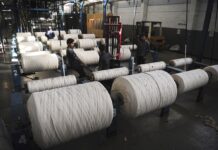Cotton prices across Pakistan have continued to fall, with rates dropping by Rs500 per maund during the past week to Rs15,500, as weak global demand and high domestic production weigh on the market. The decline has raised fears that many ginning units may again face heavy financial losses this season.
According to the Cotton Ginners Forum, the ongoing slump in global and domestic cotton markets has hit the entire value chain, forcing several textile and ginning factories to halt operations.
Forum Chairman Ehsan-ul-Haq said that Pakistan’s high energy tariffs and interest rates have eroded the competitiveness of textile exports, pushing the cotton sector into crisis.
He urged the government to prioritise support for local industries and lower production costs instead of spending over Rs600 billion annually on the Benazir Income Support Programme (BISP).
Meanwhile, data from the Pakistan Cotton Ginners Association showed a 40% increase in cotton arrivals as of September 30 compared to last year, adding further downward pressure on prices. Cotton arrivals are expected to remain high over the next two weeks.
In Sindh, cotton prices ranged between Rs14,800 and Rs15,300 per maund, while in Punjab, prices were between Rs14,750 and Rs15,300. The Karachi Cotton Association reduced its official spot rate by Rs500 per maund to Rs15,100.
At the international level, cotton futures in New York traded between 63.84 and 68.10 cents per pound.
Industry experts said lint prices have not declined proportionally to raw cotton, creating further strain for ginners. They warned that unless energy costs are reduced and production efficiency improved, the cotton sector could see widespread closures.
Sajid Mahmood of the Central Cotton Research Institute (CCRI) Multan said outdated ginning technology, substandard seeds, and weak enforcement of the Cotton Control Act have reduced fiber quality and export competitiveness. He called for the modernization of ginning units and quality-based price mechanisms to encourage farmers to grow premium cotton.
The All Pakistan Textile Mills Association (APTMA) also expressed concern over high industrial power tariffs, saying electricity costs have risen from 10.4 cents/kWh in May 2025 to 11.7 cents/kWh in September, making textile production unviable.
APTMA leaders said regionally competitive energy pricing is essential to prevent further deindustrialization and restore export growth.
























